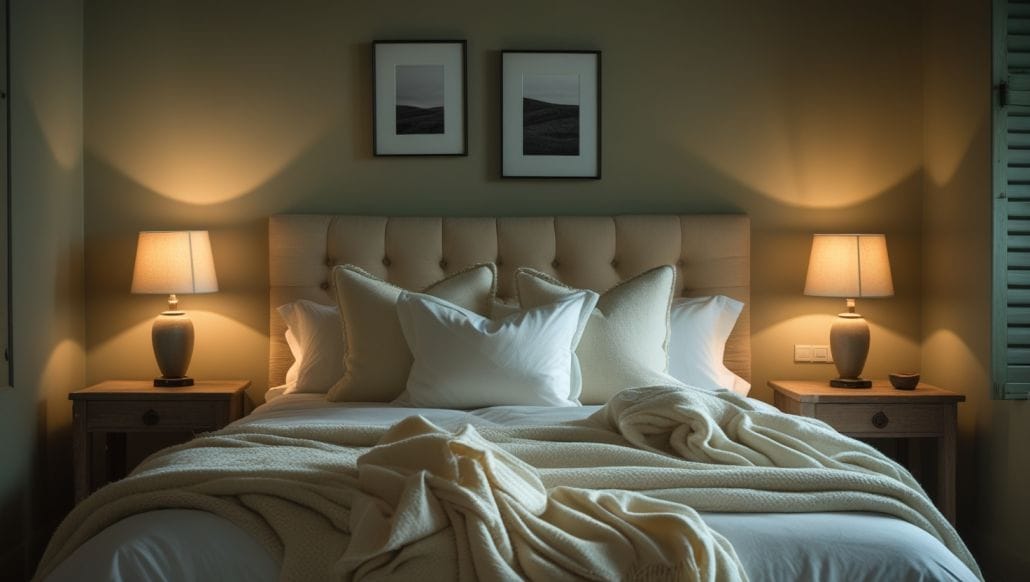Is It Insomnia or Just a Bad Week?
Struggling to sleep? Learn if it’s just a rough week or real insomnia—and discover simple, science-backed ways to get your nights back on track.

Ever wonder if a few bad nights mean you’re slipping into real insomnia—or just hitting a rough patch? If sleep suddenly feels impossible, you’re not alone.
The key is knowing when it’s a passing storm and when it’s time to step in. Guess wrong, and you risk making it worse. You’re here because you’re ready to turn this around. Let’s dive into how to spot the difference and reclaim your nights.
When a Bad Week Tricks You Into Thinking You Have Insomnia
First, here’s the reality: almost everyone hits patches where sleep goes sideways. A stressful project, an unexpected life curveball, a few nights of bad choices—you can break your natural sleep rhythm faster than you think.
This kind of short-term chaos is called acute insomnia. It's common, and in most cases, it fades on its own once the stressor passes or you recalibrate your habits. Acute insomnia usually lasts days to a few weeks. No diagnosis. No life sentence.
True, chronic insomnia is different. Sleep experts define it by a clear pattern: trouble falling asleep, staying asleep, or waking too early at least three times a week, for three months or longer.

It doesn’t ebb and flow with what’s happening in your life. It sticks around, grinding down your energy, focus, and recovery day after day.
If you’re dealing with bad sleep because you’re drowning in deadlines or bingeing late-night TikTok, that’s a short-term disruption. Annoying? Yes.
Permanent? No. But if you let short-term problems drag on without stepping in, your brain starts to build the wrong kind of sleep muscle memory—associating bed with frustration, anxiety, and endless clock-watching.
Sleep isn't fragile, but it's trainable. If you keep reinforcing the wrong cues, even accidental ones, your body will learn them. Fast.
Why You’re Sleeping Badly—and What Your Body’s Actually Trying to Tell You
Acute sleep struggles usually have a trigger. Nail down what’s hijacking your nights and you’ve got a massive advantage.
It could be external: unpredictable work hours, noisy neighbors, late-night gaming marathons, endless doomscrolling under blue light.
It could be internal: racing thoughts, a spike in cortisol from late workouts, caffeine that’s still loitering in your system from that 4 PM "pick-me-up" latte.
Your body wants to sleep. It’s wired to crash naturally once certain biological processes click into place: core body temperature dropping, melatonin rising, brainwaves slowing down.
When sleep gets disrupted, it’s usually because your environment, behaviors, or stress response are jamming the system.
Instead of fighting your body, start working with it. Stack the deck in favor of the systems already built to knock you out.
How to Break a Bad Sleep Cycle Before It Becomes Your New Normal
If you’re still in the "bad week" zone, the goal isn’t to overhaul your life or obsess over a perfect sleep score. The goal is to interrupt the feedback loop that's making your nights worse.
Start by getting out of bed when you're wide awake. Yes, it feels counterintuitive. But lying there stewing teaches your brain that bed = stress, not sleep. After 15–20 minutes of tossing and turning, stand up.
Keep the lights low. Do something calming but dull: organize your sock drawer, scribble random thoughts in a notebook, sip herbal tea you don’t even really like.
When you get sleepy again—heavy eyelids, nodding off without meaning to—crawl back into bed. Build a simple, predictable wind-down routine. Think ritual, not rigid schedule.
The science is clear: doing the same relaxing activities in the same order each night trains your brain to transition smoothly into sleep mode. Hot showers, dimming lights, soft music, mellow stretching—whatever slows your nervous system wins.
Tighten your light discipline. Bright light blocks melatonin, the hormone that primes you for sleep. That quick phone check in bed?
It resets your body’s clock, convincing it that it’s still party time. Cut screen exposure sharply an hour before bed. If you need tech, at least throw your devices into "night mode" to limit blue light.
Last piece: lock down your wake-up time—even after a rough night. No sleeping in, no "catching up" with three extra hours on Sunday. Consistency anchors your body’s circadian rhythm. If you only fix one thing, fix this.
When to Take It More Seriously
Sometimes, even after getting smart about your habits, sleep stays stubborn. That’s when it’s time to move from DIY fixes to bigger tools.
Chronic insomnia often needs an intervention called CBT-I (Cognitive Behavioral Therapy for Insomnia). It’s the gold standard, backed by mountains of research, and it works by rewiring how your mind and body relate to sleep.
It teaches you to defuse anxiety around bedtime, strengthen your natural sleep drive, and rebuild trust in your body’s rhythms.
CBT-I doesn’t mean months of therapy couches or massive lifestyle overhauls. Many people see serious gains after just a few sessions—or even with app-based programs that walk you through the basics.
Here’s the truth that gets lost: the fundamentals still matter most. Whether your sleep issues are short-term or deep-rooted, success comes from mastering the basics first: light, timing, routine, movement, and mindset.
Why It’s Worth Fixing Your Sleep—Now, Not Later
Sleep isn’t just about feeling less groggy. It’s about your whole life operating better.
Real, quality sleep turbocharges your energy. It sharpens your focus and reaction time. It supercharges your workouts and recovery.
It smooths out mood swings. It even makes sticking to healthy eating choices feel automatic instead of like a daily war.
When you’re sleeping right, you don’t have to "push through" life. You move through it with power, clarity, and momentum. Sleep isn’t downtime; it’s performance fuel.
Final Thoughts
One bad week doesn’t define you. One month of rough sleep doesn’t mean you’re broken. It just means it’s time to step up smarter—not harder.
If you’re hitting a rough patch, start tonight: cut the screen glow early, give yourself a low-key wind-down, get out of bed if sleep’s not happening, and lock your wake-up time no matter what.
You don’t need a perfect night—you need a consistent pattern that gives your body a chance to remember what it already knows.
Better sleep is within reach. Start building the habits tonight that future you will thank you for. No waiting. No complicated protocols. Just a smarter, stronger, better-rested version of you, one night at a time.




